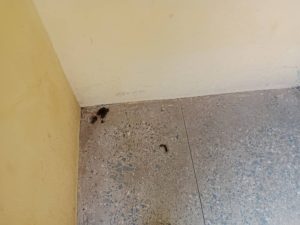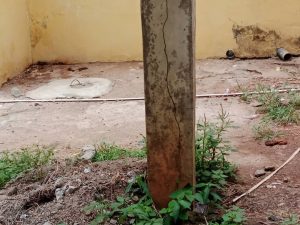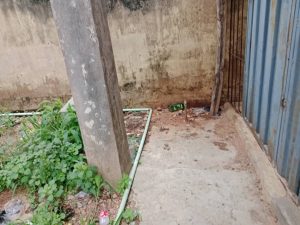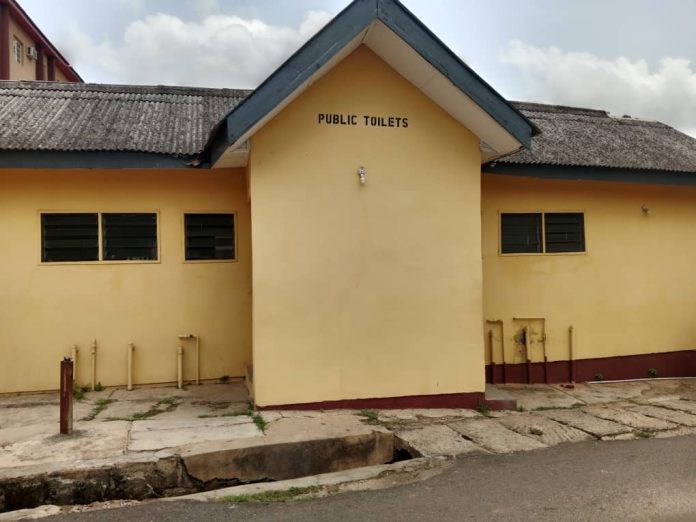Human waste has taken over the premises and surroundings of the Osun State University Teaching Hospital, Osogbo.
Many people who spoke with THE POINT lamented that some relations of patients and traders around the facility defecate indiscriminately on the floor in desolated areas of the hospital owing to lack of functional public toilets.
They said that the offensive odour and flies that concentrate on these spots posed health risks to staff, patients and visitors at the hospital.
During a two-week observation by THE POINT, it was discovered that pregnant women, patients and visitors to the hospital ease themselves on the premises of the hospital.
Some of the patients and visitors, who spoke with our correspondent, blamed the situation on the hospital management’s failure to provide functional toilets.
According to them, there are some facilities inscribed with the phrase “public toilet” but none of them are open for use.
They lamented that if nothing was done to address the challenge on time, an epidemic could break out.
When our correspondent visited one of the public toilets located close to the labour ward and morgue of the hospital, both the male and female sections were under lock and key. It was gathered that the toilets were supposed to serve the hospital’s visitors.
A check on the toilet’s surroundings revealed that desperate persons at the hospital defecated and urinated at the entrance of the toilet as the place stinks.
Speaking with one of the caregivers at the labour ward, Ismaila Ajibade, he said he came to the hospital to look after his pregnant wife who was on admission in the hospital, disclosing that he has been going to the public toilet area to ease himself since arriving at the hospital.
Ajibade said he used to take commercial transport to a commercial institution close to the hospital to answer the call of nature.
He said, “I have been here for more than four days now. Each time I have to defecate, I take my bike to a bank close to the hospital because I have tried accessing their public toilet but it is always locked. The toilet surrounding is always messed up as those who could not endure, defecate on the floor. Whenever I pass the place when visiting the blood bank, I perceive a horrible smell. Other people taking care of their relations have complained of their difficulty getting places to defecate.”
Another visitor, simply identified as Titilayo explained that she always left the hospital for a relative’s house to answer the call of nature, noting that, “If one is not careful, one could get infected in this place. Whenever I am pressed, I always go to a relative’s house at Station Road. After I am done, I return to the hospital to watch over my relatives.”
“The first time I was pressed and made attempts to use the toilet built for staff and admitted patients inside the female ward, the nurse on duty denied me access, saying it is strictly meant for staff and patients.
“So, I asked around for a public toilet. The one someone showed me looked abandoned and shut. The surroundings have been messed up and smelling. I had to run out of the area before I am being admitted for treatment of infections,” she decried.
But another visitor, who did not want to be named, said he tried to moderate her feeding to avoid having any reason to ease himself.
The man, whose newly born baby had been in the Special Care Baby Unit for ten days, said, “I try to moderate the way I eat here so as to avoid being pressed and wanting to go to the toilet. The toilet here is built inside the unit for a few nursing mothers who rented apartments inside the unit. Men are not allowed to get in there or use the toilet facility. So, what I do is that I take my motorcycle and start driving around town to see if there is a bush I can defecate.”
It was also observed that passersby and visitors pee and defecate at the entrance and surroundings of one of the main gates of the hospital.
Our correspondent saw different moulds of human waste in the area, as urine had defaced the wall and oozed unpleasant odour.
A woman was seen by our correspondent tendering to her child who was defecating inside a gutter close to the OHIS clinic in broad daylight.
Disturbed by the development, our correspondent put a phone call to the Chief Medical Officer of the teaching hospital, Babatunde Afolabi, who said the public toilet was locked because it was undergoing repair, promising that the facility would be checked and reopened for use.
However, when our correspondent returned to the hospital a week after, the public toilet was still locked.
Some visitors at the hospital have called on the hospital management to make available sufficient and accessible public toilets for the use of caregivers and visitors at the hospital.
The situation is not different in most public hospitals across the country as lack of accessible public toilets leave visitors with no choice but to engage in open defecation.
The World Health Organisation in its publication on Hospital Hygiene and Waste Infection said people could become infected with diseases from a dirty hospital environment.
It said, “In a health-care facility, the sources of infection and of the preceding contamination may be the personnel, the patients, or the inanimate environment. The hospital environment can be contaminated with pathogens.
“Nosocomial infections – known also as hospital-acquired infections, hospital-associated infections, and hospital infections– are infections that are not present in the patient at the time of admission to hospital, but develop during the course of the stay in the hospital.”
It added that patients with underlying disease, newborn babies, and the elderly, had less resistance and could develop an infection after contamination.”
A Joint Monitoring Programme report by the World Health Organisation and the United Nations Children’s Fund had revealed that 32% of health care facilities in Nigeria had no basic sanitation services as of 2021.
The report noted that patients, visitors and staff members are at the risk of infections that could potentially be spread through faecal routes in health facilities without sanitation infrastructure.
The WHO Director, Department of Environment, Climate Change and Health, Maria Neira, said, “Hygiene facilities and practices in health care settings are non-negotiable. Their improvement is essential to pandemic recovery, prevention and preparedness.
“Hygiene in health care facilities cannot be secured without increasing investments in basic measures, which include safe water, clean toilets, and safely managed health care waste.”
Also, the UNICEF Director of WASH and Climate, Environment, Energy, and Disaster Risk Reduction, Kelly Naylor, said, “If health care providers don’t have access to a hygiene service, patients don’t have a health care facility.
“Hospitals and clinics without safe water and basic hygiene and sanitation services are a potential death trap for pregnant mothers, newborns and children. Every year around 670,000 newborns lose their lives to sepsis. This is a travesty – even more so as their deaths are preventable.”






